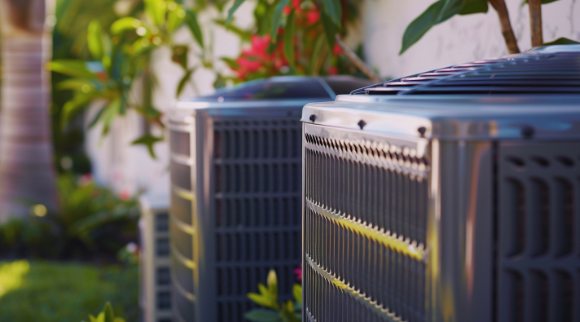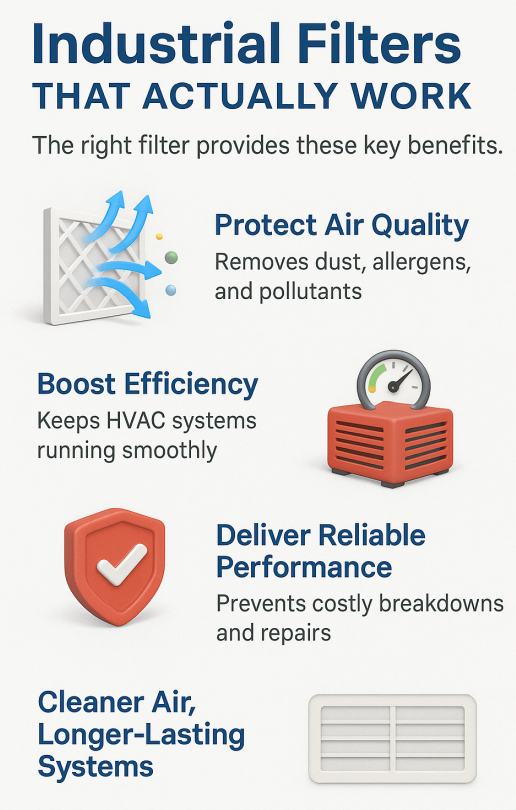Industrial Filters That Actually Work – Discover the Secret to Cleaner Air & Longer-Lasting HVAC Systems
Most people think of filters as simple dust catchers—but after working with thousands of homeowners and businesses, we’ve seen firsthand how the right industrial filter can transform both air quality and system performance. A well-made filter isn’t just about what it blocks; it’s about how it balances airflow, protects equipment from costly breakdowns, and creates a healthier space for the people who live and work in it.
Our experience has shown that cheaper, off-the-shelf options often cut corners—leading to clogged systems, rising energy bills, and air that still feels “stale.” By contrast, high-quality industrial filters are engineered with precision: layered media, sturdy frames, and MERV ratings that actually match real-world conditions. The result? Cleaner air you can feel, longer-lasting HVAC systems you don’t have to worry about, and peace of mind knowing your home or workspace is truly protected.
Top Takeaways
Industrial filters protect HVAC systems and improve air quality.
Quality filters pay for themselves with energy savings.
Real-world results: fewer allergies, fewer service calls, lower bills.
Right MERV rating + schedule = clean air and strong performance.
Durable filters are a long-term upgrade, not an expense.
Industrial filters are designed for more than just catching visible dust—they’re built to tackle the microscopic particles that affect both air quality and system performance. By using advanced filtration media, they capture allergens, pet dander, mold spores, and even fine debris that cheaper filters often miss. This means cleaner, healthier air for people and longer-lasting protection for HVAC systems.
The real difference comes down to durability and precision. Industrial filters use sturdier frames and carefully engineered layers of filtration material. This ensures consistent airflow, which not only reduces strain on your system but also keeps energy costs lower over time. In our experience, homes and businesses that switch to higher-quality filters often notice fewer breakdowns, better air circulation, and improved comfort within weeks.
Choosing the right industrial filter is about more than size—it’s about selecting one that balances filtration power with efficiency. When you do, you’ll protect your HVAC system, safeguard your indoor air, and enjoy the peace of mind that comes from knowing your filter is actually doing its job.

“After years of working with homeowners and businesses, we’ve seen that the real value of industrial filters isn’t just in what they catch—it’s in how they protect HVAC systems from costly strain while delivering cleaner, healthier air you can actually feel. A well-built filter is the difference between a system that lasts and one that fails when you need it most.”
Case Study & Real-World Insights
Allergy Relief at Home
A family with two children struggled with seasonal allergies. Standard filters weren’t stopping pollen and dander. They upgraded to industrial-grade filters with higher MERV ratings. Within weeks, symptoms dropped, sleep improved, and the HVAC tech found cleaner coils and better airflow. Their energy bill went down by almost 15%.
Small Business Cost Savings
A 20-person office faced frequent HVAC breakdowns. Cheap filters clogged quickly and strained the system. Switching to durable industrial filters cut service calls from four times a year to just once. The business saved over $800 annually and enjoyed cleaner air and a more comfortable workplace.
Payback You Can See
Industrial filters reduce HVAC energy use by up to 10%. We’ve seen this proven in both homes and businesses. The savings show up in lower bills, fewer repairs, and healthier indoor environments.
Supporting Statistics
Industrial filters don’t just clean air. They impact energy use, maintenance, and system life. Research and real-world experience prove it.
Energy Use
Industrial filters account for about 16% of a commercial building’s HVAC electricity. Better filter design reduces fan strain and lowers bills.
Source: Mann+Hummel
Efficiency & Labor Savings
Low-pressure-drop filters cut HVAC energy use by 15–30%. They also reduce filter change labor by up to 80%. Real-world results show better airflow, fewer clogs, and more comfortable spaces.
Source: Camfil
ROI Timeline
Premium air filters often pay for themselves in 6 months to 3 years. Savings come from longer lifespans, fewer replacements, and higher efficiency.
Source: ACEEE
Final Thought & Opinion
Industrial filters do more than trap dust.
They protect systems, cut energy costs, and improve everyday air quality.
We’ve seen the difference first-hand:
Cleaner air that reduces allergy symptoms
Quieter HVAC systems that last longer
Fewer surprise service calls
Real savings on monthly energy bills
Homeowners breathe easier, offices reduce downtime, and businesses often see filters pay for themselves within months.
The bottom line: choosing a quality industrial filter isn’t just a purchase—it’s an upgrade to health, comfort, and peace of mind. Once you experience the difference, it’s hard to settle for anything less.
Next Steps
Find your filter size.
Check the label or measure length × width × depth.
Pick the right rating.
Everyday dust → Standard MERV.
Allergies or pets → Higher MERV.
Offices/industrial → Low-pressure-drop industrial filters.
Choose quality
Durable frames and layered media last longer and save money.
Replace on schedule
Every 60–90 days, or more often in heavy-use spaces.
Track results
Monitor bills, airflow, and comfort. Improvements usually show within a month.
Frequently Asked Questions
What are industrial filters used for?
Industrial filters are designed to remove dust, allergens, and microscopic particles from the air. They protect HVAC systems from damage and improve indoor air quality in homes, offices, and commercial spaces.
How often should industrial filters be replaced?
Most industrial filters should be replaced every 60–90 days. In high-use environments—such as homes with pets, businesses with heavy traffic, or areas with high pollution—filters may need to be changed more frequently.
Do industrial filters save energy?
Yes. High-quality industrial filters reduce system strain by maintaining steady airflow. Studies show they can lower HVAC energy use by 10–30%, often paying for themselves through savings.
What is the difference between industrial filters and standard filters?
Standard filters capture basic dust and debris but clog quickly and miss finer particles. Industrial filters use stronger frames, layered media, and precise designs that last longer, improve air quality, and reduce costly breakdowns.
How do I choose the right industrial filter for my system?
Start by confirming the correct size from your current filter or measuring your filter slot. Next, select a MERV rating that fits your needs—standard ratings for dust control, higher ratings for allergies and pets, and industrial-grade for demanding environments.
Meta Description:
Breathe easier with industrial filters that protect your air & HVAC. Click here to see how the right filter saves money and boosts performance.
Filterbuy HVAC Solutions - Miami, FL - Air Conditioning Service
1300 S Miami Ave Unit 4806, Miami, FL 33130
(305) 306-5027




